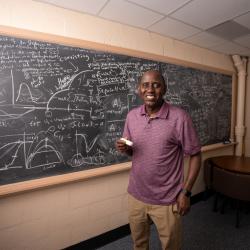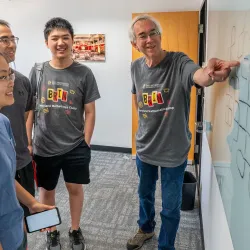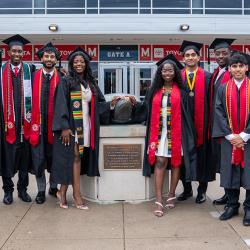Pilot Project
Air Force officer and UMD statistics graduate student Maddie Fischer sees her math skills take flight.
Maddie Fischer has always liked numbers, but she’s especially excited to see where they’ll take her.
“I like how you can go anywhere with math,” said Fischer, who enrolled in the University of Maryland’s graduate statistics program after earning a bachelor’s degree in applied mathematics from the U.S. Air Force Academy in 2023. “You could go to law school or med school or be an engineer with math as a background because it’s the basis of everything.”
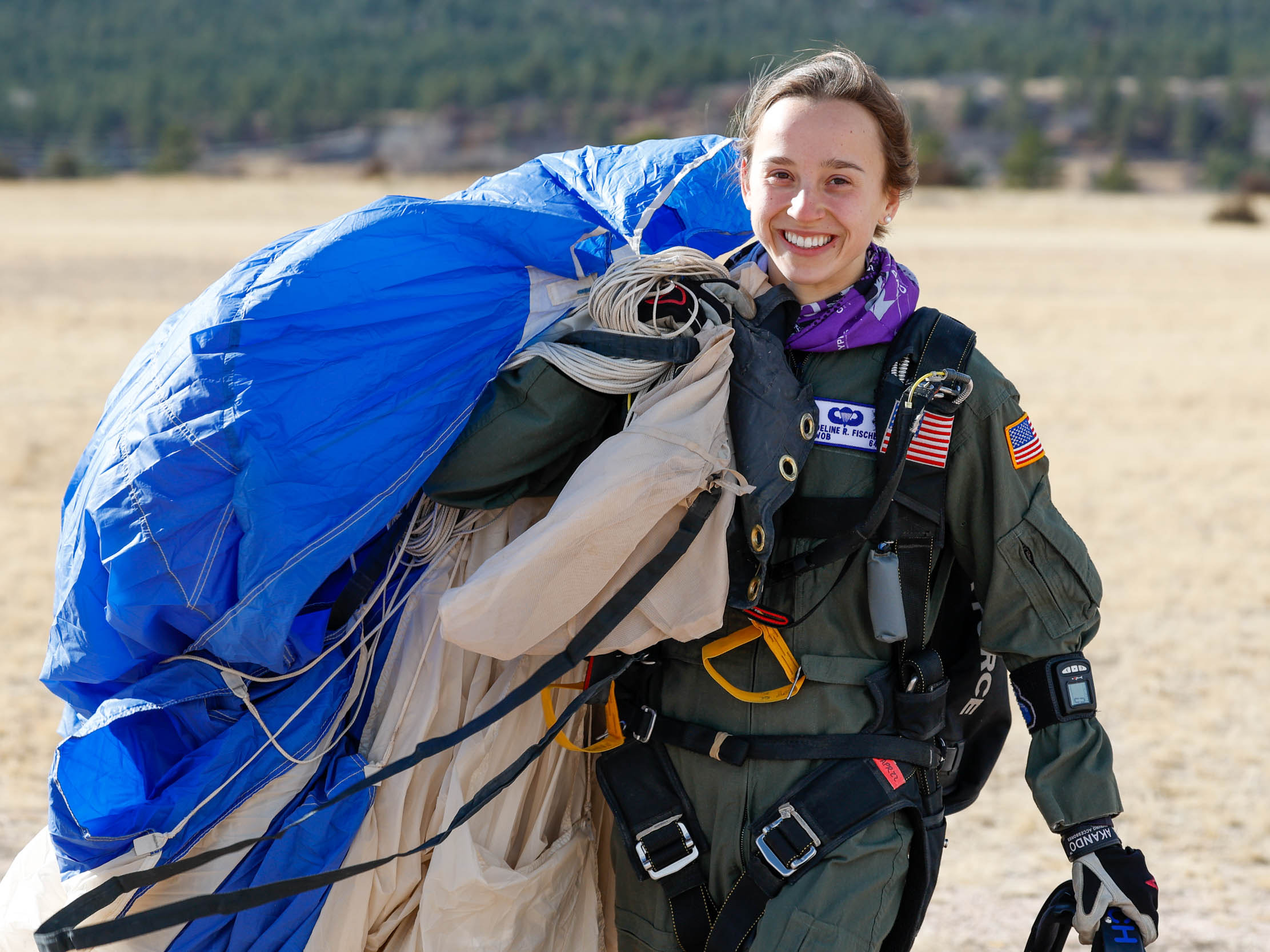
As an Air Force 2nd Lieutenant who has been assigned to work as a helicopter pilot after earning her master’s degree, Fischer hopes her math skills will take her to new heights. Her ongoing research with the Alfred Gessow Rotorcraft Center (AGRC) in UMD’s A. James Clark School of Engineering uses human factors engineering and statistical analyses to make helicopter flight safer for future pilots like herself.
Attending grad school at a civilian university—especially to study math—is an unconventional path to pilot training. However, Fischer is excited to expand her educational horizons before earning her wings.
“Most people go straight to pilot training [after the Air Force Academy] because there aren’t that many slots to go to grad school. It’s very competitive,” she said. “Being at UMD is kind of a miracle for me.”
Diving in
Before Fischer knew that she wanted to study statistics or specialize in helicopters, she had another goal in mind.
“First and foremost, I wanted to serve, which is why I started looking at military academies,” she said. “I was most interested in the Air Force Academy because I wanted to fly, and I also wanted to support an important mission with a group of people who felt the same way.”
After graduating from high school near Philadelphia, Fischer moved to Colorado in 2019 to start her Air Force training and education. She rose through the ranks and became a squadron commander, overseeing 120 cadets and helping freshmen integrate into the academy. This leadership role helped her thrive in predominantly male spaces.
“That for me was a really impactful experience because it was the first time where I had the authority to influence all of these people’s experiences,” she said. “As a woman in the Air Force, you kind of have to be loud and strong-minded. I think that learning to be a leader in that environment gave me the tools to speak up and to value voicing my opinion and my thoughts.”
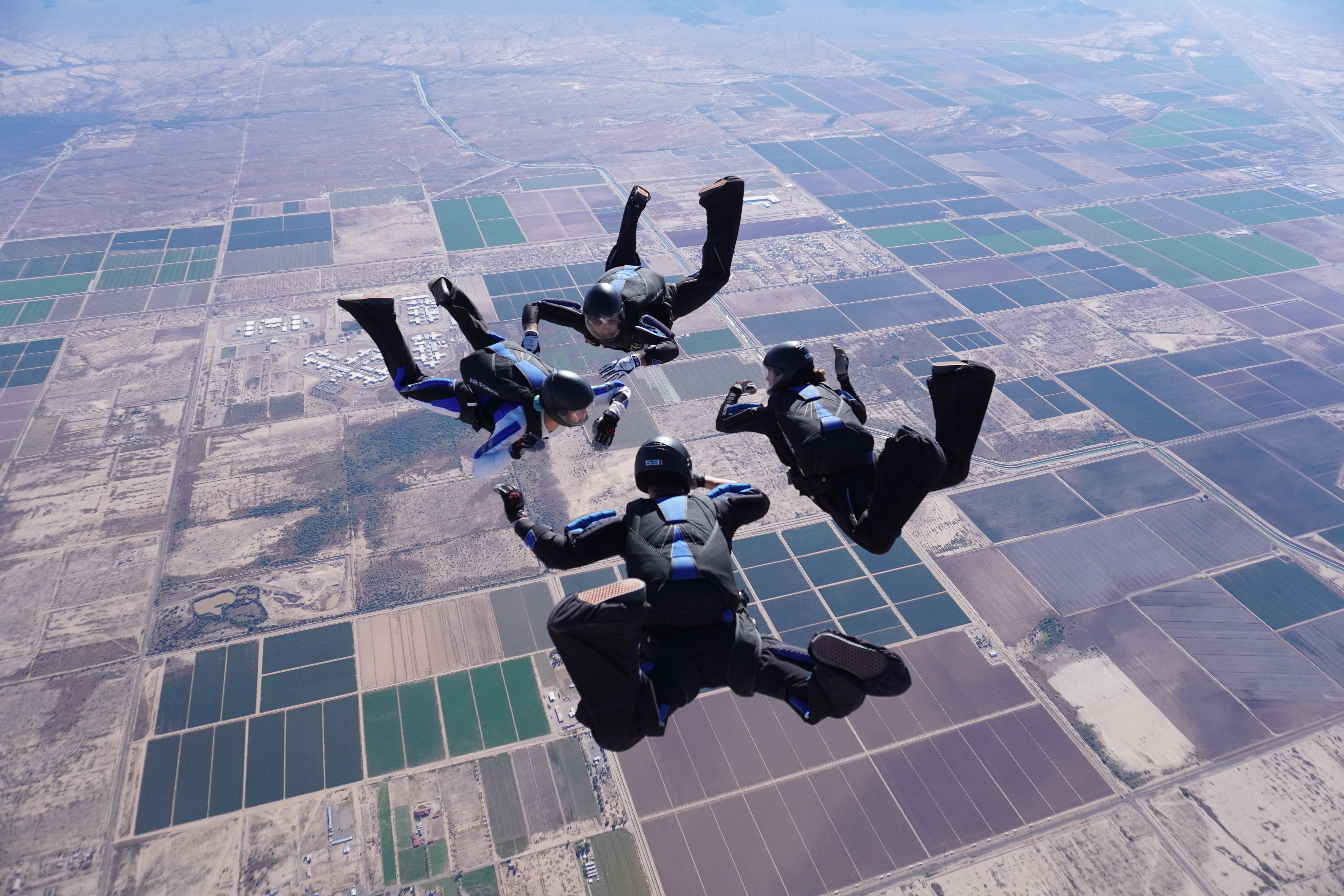
Her Air Force training also empowered her to face her fears. During her sophomore year at the academy, she landed one of 22 spots on the Air Force Parachute Team, the Wings of Blue, after completing a cadet-led skydiving course.
Fischer specialized in four-way formation skydiving as a member of the competition team, which involved syncing up with her teammates to form a rapid series of numbers and letters in the sky during their roughly 35 seconds of free fall.
She ultimately became a commander of the very course that launched her love of skydiving. In that role, she oversaw dozens of instructors and roughly 600 students and discovered a passion for instructing.
“For me, the team wasn’t ever about skydiving or competing,” she said. “It was about conquering fears, learning to stay calm in stressful environments and teaching others to do the same.”
While jumping out of a plane is undeniably scary, Fischer said it gets easier with practice.
“I think 80 jumps was the point where I stopped being debilitatingly afraid,” Fischer said. “After that, I was able to focus more on the objective of the jump.”
She has now jumped out of a plane 486 times—and she’s just getting started.
‘Excited to get started’
After graduating from the Air Force Academy, Fischer applied to several graduate programs but was ultimately swayed by an invitation to join UMD Aerospace Engineering Assistant Professor Umberto Saetti’s lab in AGRC, an award-winning rotorcraft center that partly specializes in helicopter development.
“I reached out to Dr. Saetti in the rotary lab because I wanted to fly helicopters,” Fischer said. “I said, ‘I want to go to the University of Maryland for statistics, but I also want to fly helicopters—can we do anything together?’ And it ended up being a great fit. The aerospace engineering department and math department supplement each other in a really interesting way.”
For her master’s thesis, Fischer is testing different methods of informing helicopter pilots about their surroundings, including sound and haptic alerts to supplement vision. This is particularly important when navigating environments with snow, sand and other low-visibility conditions, which helicopter pilots are often tasked with.
“We’re investigating localization, which is how you perceive a signal in the immediate area around your body,” Fischer said. “There’s basically a radius around your body that you encode as meaningful, so if you feel something on your body or hear something in that area, we’re seeing how that corresponds to a visual target. We’re going to do a statistical analysis to see how precise and how accurate these metrics are and use them to develop an optimal multisensory integration model.”
Fischer even worked on the project alongside her father, Doug Fischer, an associate technical fellow at Boeing who specializes in human factors engineering—how people interact with aircraft systems.
“My dad and I have been able to collaborate on this project, and he is also coming to guest lecture at Maryland later this semester, so it’s been a really special experience for me,” Fischer said. “With his credentials, he is advising as a subject matter expert on the human factors-related concepts involved in our project, such as the applications and implementation of haptic cueing.”
While Fischer is interested in the engineering aspects of aviation, she ultimately prefers flying planes over designing them. After she graduates from UMD later this year, she will attend Air Force pilot training at Fort Novosel, Alabama, where she hopes to specialize in search and rescue operations. This could involve everything from saving soldiers in combat zones to providing aid during natural disasters or plucking lost hikers from national parks.
“I’ve always wanted to support that mission,” Fischer said. “I’ve been passionate about volunteering and community service all my life and I knew that I wanted my career to be something that makes a difference or helps others in some way.”
Fischer is enjoying her time at UMD but is equally ecstatic to start pilot training, bringing her one step closer to seeing her dreams take flight.
“I’m excited. A lot of my friends are [at training] now, so I’m watching them go through it,” Fischer said. “It’s the career that I’ve worked so hard for, and I’m just so excited to get started on it.”




